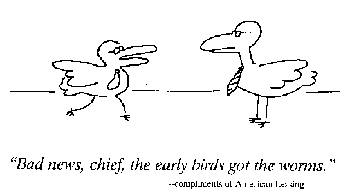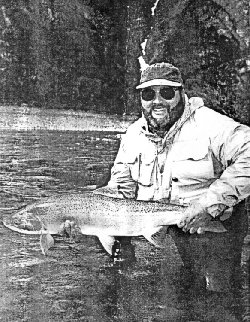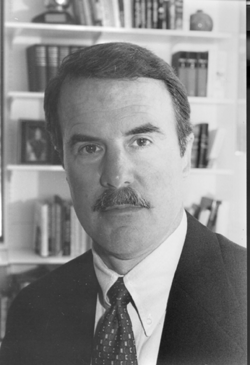


Contents:
Tribute June 2, 1954 - August 3, 1996
| Phil
Hyde Phil Hyde died of leukemia at the age of 42, leaving a wife, Karen and two small children, Karen, Hayes, and Mathew (Mac), ages 6 and two.. After the eulogy, there was a reception. Good wine, beer, food with all his friends; something Phil would have definitely enjoyed.
| |
| I talked to many people afterwards, from all walks of life; race, religion, age,gay and straight. I asked them all the same question. What had they learned from this. The answers I got were almost all the same, " Life is short. " "Life is precious." "Enjoy life while you can." Almost two years ago, Phil had spent several months at Stanford Hospital where he was expected to die, but a bone transplant in December, 1994, from his sister saved him. I could not emotionally visit him. I heard he also was a terrible patient, yelling, screaming, angry at everyone, with nurses reporting "sick" so they wouldn't have to have his duty. They said, "He is too mean to die." Phil really knew no fear. He was a shrewd and tough litigator, a physically big man, extremely proud of his reputation as a very tough hard ball attorney at Holtzman, Wise and Shepard in Palo Alto, California. He didn't die. He surprised them all. I think he argued at the Pearly Gate that he wasn't ready to come in, and won. He went back to work. He worked harder. He played harder. After several months being back, he lead the split of his 1886 law firm from their parent in New York. He brought in new clients. As managing partner, we did a new computer lease for him. I knew he and his family personally way before I did business for him. His bankhad just been bought out. I was helping him move to another bank. I had knownhim for years. I brought him to wine society dinners, shared wine with him, helped him with the same passion I have for roses. His wife is vice-principal at Saratoga High School. He went to all events as she did. He lived life to the fullest. I think he was always the highest bidder at the Saratoga High School Sports auction. There were changes in the computer lease (as there seem to always be) and in mid- July, signing the papers, he said he had to go in for more tests. He was getting tired. It didn't register to me. He was a big man, indestructible, passionate, powerful; he had beaten the big "C." He was always going eighteen hours a day, traveling not only all over the country but to England and Australia. He told me he was going home to sleep, at about seven pm. I said, " Won't Karenbe mad at you? " Meaning you work all the time, go fishing, hunting, drink withthe guys, play poker, and she wants you to spend more time with her and the children. "She is wonderful, " he told me in a very warm tone. " She puts up with me, takes care of everything. I couldn't ask for a better partner. She makes all the difference for me." He paused, looked out the window of the second floor conference room, and then back to me, saying, " She's furiously angry at me now because I am not home right now." I remember this verbatim. I wasn't expecting what he said, especially when he finished signing the papers and added, " ...and Dr. Menkin. You work too hard." I thought to myself, " He? should talk." I don't see any changes in his lifestyle after he almost dies of cancer. What did he learn? He is working harder than ever before. There is no change in his lifestyle. If anything, it is more intense. Next week I heard through the grapevine, the tests were negative. They brought him in the hospital right away. His sister was flying in from England for a bone marrow. His family was by his side. Then he died; quickly. I couldn't visit him. When I was fifteen, my best friend's mother died of cancer. I went through my former best friend Peter Carter's first wife dying of cancer. Then my wife died of cancer in a long manner. My mother two years ago died of cancer I wound up taking full care of my father with Alzheimer's and Glaucoma. I remember the last walk I had with my mother. I remembered all the people I knew who had cancer, like Frank Sanchez, a dear friend, who I still think of and miss greatly. To visit Phil, was too emotional for me. Three hundred of his friends joined the "Celebration of Life" at Hamilton Circle at the Family Farm in Woodside, California. It was a roast. He was a very unique person. A real individual. Very funny. Very demanding. You knew when he was in the room. We laughed. We cried. We missed Phil. His wife, braver than most people I know, finished the ceremony with stories about her husband, his lifestyle; funny stories with his children, and told us during this time, Phil's last words to her: " What the fuck just happened? " You had to know Phil. The laughter brought down the house. We all shared in common that we loved him and now miss him. What I learned from his passage: I didn't appreciate him as much as I do now. I wish I had spent more of my time with him. | ||
" We are now living on Internet time," Intel's Andrew Grove says, where everyone is traveling at 'warp speed'," he adds. As the undisputed leader in manufacturing of the heart of a computer, CPU processing ( Pentium and Pentium Plus,) we should listen carefully to what he predicts.
" It's a new territory ," he says, " and the cyber equivalent of the Oklahoma land rush is on. "
Internet time finds Beta ( test ) versions being rushed out three and four times a year. Once programs were shrink-wrapped every 18 months to two years. They waited on the computer shelf for a customer. Now they are sold at Costco, Walmart, and even Safeway.
Jackson & Perkins discovered almost twenty years ago that rose growers would pay to receive "test roses." In fact, aficionado's such as myself consider it a privilege to perhaps get the best rose a few years before it is introduced, or to keep one that is not introduced.
The concept is very similar. We will pay for the privilege of a beta test software. We will "subscribe" to "up-dates." And to tell you the truth, I think the final version is not that far from the "test" version. In the software world, there are always patches even for the final version. In reality, there is no "final" version.
We all want "faster." High speed CPU is ten times faster than a few years ago and only a few hundred dollars. Ram is cheap and plentiful. Hard drives are 1 gigabit for sale all the time. CD ROM's have replaced floppy drives. 17 inch monitors are becoming "common."
Jackson Evergreen, UC Davis Chancellor, told the graduating class California has gone through fifth major economic cycles since the Gold Rush brought people to this state. He said the Defense Industry phase is over and the Microchip phase has begun.
The changes are not only in personal computers, but main frames, automobiles, and in every industry where the device will produce a better and less expensive product.
The Internet is providing instant, inexpensive communication and immediate information. It has the ability provide superb customer service at very little cost. The ability to access Federal Express tracking status is only one example.
We are on Internet time where hardware and software manufacturers advertise their product on local and national radio and television. In fact, who would have thought a company that produces "computer parts" would find it to their image ability to pay $3 million for "3Com Park" where the San Francisco Giants and 49'ers play.
It is everywhere. In fact, the most popular cartoon strip is no longer "Blondie," or "Peanuts" but "Dilbert". This "computer engineer" is front page of the comics. There are collections, shirts, mugs, and even an audio tape of by author Scott Adams, reading his work.
"Dilbert" is not only very popular here, but across the nation. He recently made the front page of Newsweek magazine.
Start-ups have never been stronger in Silicon Valley, Netscape made founders multi-millionaires. Two Stanford college students went public raising $38 million for Yahoo. Two Berkeley college students started the grand daddy of them all: hotbot.com.
The New York Times noted, " Chances for a big payoff, of course, have long motivated the engineers and entrepreneurs of the Valley to work 16-hour days for months on end to get a new product out the door." Yes, It is getting so fast many large corporations cannot keep up with the constant changes, and perhaps the traditional product cycles of seemingly an endless stream of upgrades has created Internet time.
The changes that are happening are so quick many of us cannot keep up with the new software and hardware. The obsolesecence is so quick the traditional product cycles for both hardware and software has turned into a blur, an endless stream of upgrades.
The biological age of a dog is seven years for every human year. Perhaps this applies to the development of the computer and the on-line distribution of software grades. It has created the Internet year, the equivalency of three months for every human year.
| Kent Gilmore (k.gilmore@americanleasing.com) Kent C. Gilmore joins American Leasing to develop envelope and related printing equipment leases across the United States. Kent was chief operating officer and general manager of Gilmore Envelope, Brisbane, California from 1968 to 1991, also serving as vice-president of sales and marketing for Consolidated Printers, Berkeley, California. He now serves on the board of directors (1992 to present). | |
|
He is a graduate of UC Berkeley, 1968 in economics: attended San Francisco Law School. His son Michael just graduated from Harvard and his son John attends the engineering school at Cal Poly. He is an active horseman, living on his ranch in Paso Robles with his wife Dorreene. | ||
(The heart of Silicon Valley - home of AMD, Intel,
National Semiconductor, 3COM, Yahoo, among many others)
Voice: 800-727-3844 Fax: 800-727-3851
Kitm@americanleasing.com



